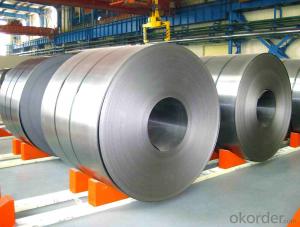Hot Dipped Galvanized Steel Coil SGCC Standard DX51D China Producter
- Loading Port:
- China main port
- Payment Terms:
- TT OR LC
- Min Order Qty:
- 10 m.t.
- Supply Capability:
- 10000000 m.t./month
OKorder Service Pledge
OKorder Financial Service
You Might Also Like
1.Description of Hot Dipped Galvanized Steel Coil SGCC Standard DX51D:
Galvanized steel coil can be used outside because of its natural ability to avoid rust or corrosion. The coil itself is usually available in different dimensions. It may range from from 6 inches to 24 inches wide (15 cm to 51 cm), and up to 10 feet (3 m) long when rolled out flat.
2.Specifications of Hot Dipped Galvanized Steel Coil SGCC Standard DX51D:
1).strong corrosion resistance
2).surface quality
3).conducive to deep processing,such as the embossed PPGI,printed PPGI&punching PPGI
4).economy and practicality
3.Hot Dipped Galvanized Steel Coil SGCC Standard DX51D Images:
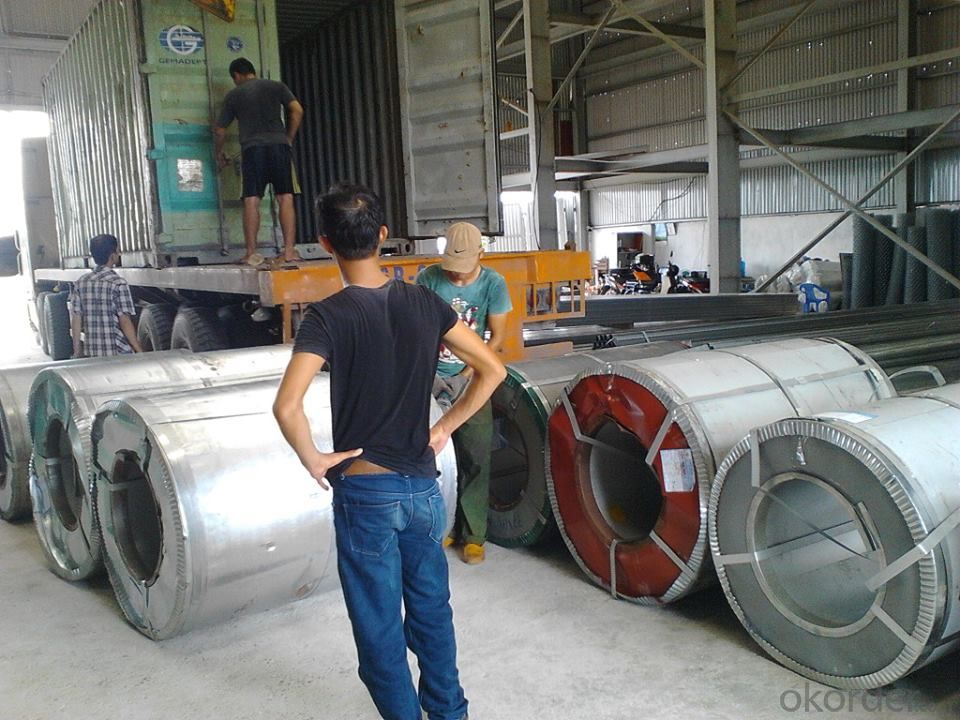
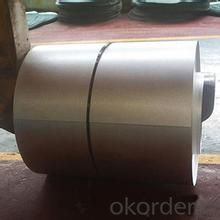
4.Hot Dipped Galvanized Steel Coil SGCC Standard DX51D Specification:
Brand | Hengfeng |
Place of Origin | Shandong, China |
Standard | AISI,ASTM,BS,DIN,GB |
Material | SGCC |
Thickness | 0.14mm-0.8mm |
Width | 600mm-1250mm |
Length | Coil |
Technique | Cold Rolled |
Zinc Coating | 40-150g/m2 |
Coil weight | 3-5 Ton/Tons |
Certificate | ISO9001:2008 |
Surface Treatment | Galvanized, hot-dip |
5.Our factory:
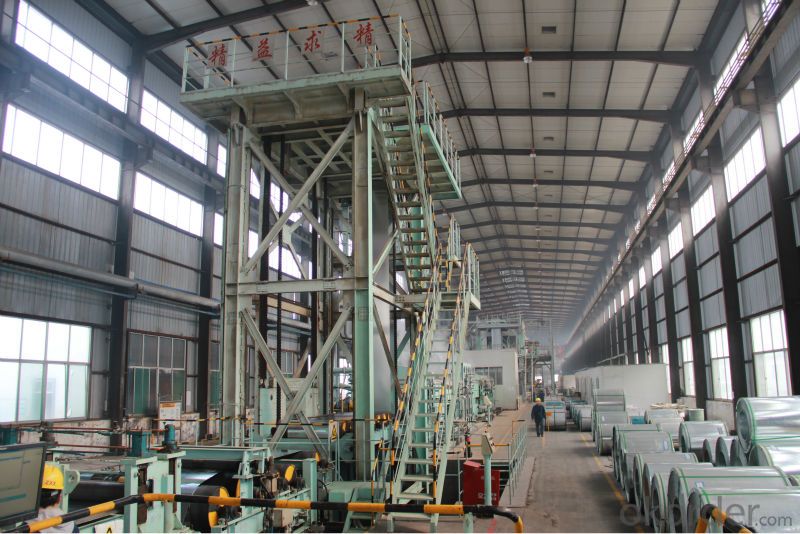
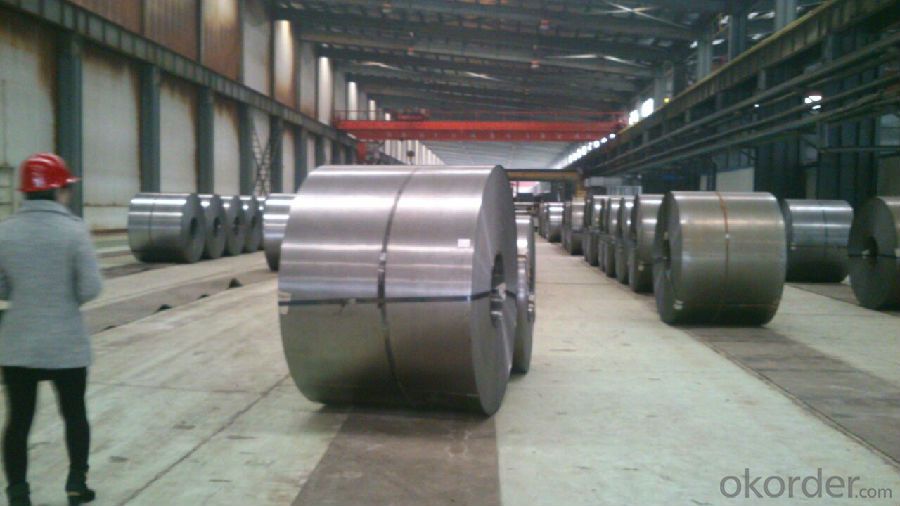
6.FAQ
We have organized several common questions for our clients,may help you sincerely:
①How about your company?
A world class manufacturer & supplier of castings forging in carbon steel and alloy steel,is one of the large-scale professional investment casting production bases in China,consisting of both casting foundry forging and machining factory. Annually more than 8000 tons Precision casting and forging parts are exported to markets in Europe,America and Japan. OEM casting and forging service available according to customer’s requirement.
②How to guarantee the quality of the products?
We have established the international advanced quality management system,every link from raw material to final product we have strict quality test;We resolutely put an end to unqualified products flowing into the market. At the same time, we will provide necessary follow-up service assurance.
③How long can we receive the product after purchase?
In the purchase of product within three working days, We will arrange the factory delivery as soon as possible. The pecific time of receiving is related to the state and position of customers.Commonly 7 to 10 working days can be served.
- Q:What are the different types of packaging for steel coils?
- The different types of packaging for steel coils typically include wooden crates, steel frames, and plastic wrapping. These packaging materials are used to provide protection and secure the steel coils during transportation and storage.
- Q:What are the different types of steel coil surface defects?
- During the manufacturing or handling process, various steel coil surface defects may arise. Some commonly encountered types are as follows: 1. Rust: When moisture or oxygen comes in contact with the steel coil, rust, a reddish-brown discoloration, may develop on its surface. 2. Scratches: While the steel coil is being handled or transported, superficial marks known as scratches can be incurred. These marks can vary in depth and severity, ranging from light surface scratches to deep gouges. 3. Stains: Exposure to chemicals or other substances can lead to stains, discolored patches that appear on the coil's surface. Removing them may prove to be challenging. 4. Roll marks: During the rolling process, impressions or indentations called roll marks may form. Uneven pressure or misalignment of the rolls causes them, resulting in lines or patterns on the coil's surface. 5. Edge wave: Imperfectly flat edges of the coil can result in a defect known as edge wave. This defect causes the edges to appear wavy or uneven and can impact the coil's overall appearance and performance. 6. Oil spots: If the oil or lubricants utilized in the manufacturing process are not adequately removed, surface defects called oil spots can manifest. These spots appear as dark patches or spots on the coil's surface and may hinder the adhesion of coatings or paints. 7. Pitting: Small, shallow depressions or pits on the coil's surface are indicative of a defect called pitting. Factors like corrosion, uneven cooling, or impurities in the steel can cause this defect. 8. Holes: Holes are severe surface defects that can arise due to various factors, including corrosion, mechanical damage, or manufacturing errors. These defects come in different sizes and can significantly compromise the coil's structural integrity. Promptly addressing these surface defects is crucial for maintaining the quality and performance of the steel coil. Regular inspections, proper handling, and appropriate surface treatments can help minimize the occurrence of these defects.
- Q:What are the advantages of using pre-painted steel coils?
- There are several advantages to using pre-painted steel coils. Firstly, pre-painted steel coils have a protective coating applied during the manufacturing process, which makes them resistant to corrosion and increases their lifespan. Additionally, the pre-painted coating provides a smooth and aesthetically appealing finish, eliminating the need for further painting or finishing. This saves time and money on additional coatings or treatments. Moreover, pre-painted steel coils are available in a wide range of colors and finishes, allowing for greater design flexibility and customization. Lastly, pre-painted steel coils are easy to install, lightweight, and have excellent durability, making them an ideal choice for various applications in construction, automotive, and other industries.
- Q:I want to buy steel. My problem is i purchase it from a middle man, so i need to know what MIld steel is. What it's real name or specifications is/are. I dont want to end up purchasing Black steel or other stuff i can sell or use...
- I wonder from your phrasing if you are referring to pipe or tubular steel. Seamless Black usually are terms used when referring to pipe. Mild steel is low carbon steel, easy to machine, form, weld. It has lower strength than medium or high carbon steels. AISI 1018 is probably the most common. If this middle man cannot provide any specifications, maybe you need a new source.
- Q:How do steel coils contribute to the manufacturing of household appliances?
- Household appliances rely heavily on steel coils, which are essential for their production. These coils, crafted from high-quality steel, are vital in providing the necessary strength and durability needed for manufacturing various appliances. One key application of steel coils in household appliances is their use in constructing the appliance's body or frame. These coils are shaped and molded into the desired structure, creating a robust foundation for the appliance. This ensures that the appliance can endure daily usage and remain intact for an extended period of time. Furthermore, steel coils are also employed in manufacturing different components within household appliances. For instance, refrigerators and air conditioners utilize steel coils in their condenser and evaporator coils, which are responsible for the heat exchange process. These coils enable efficient cooling or heating, guaranteeing optimal performance of the appliance. Moreover, steel coils find application in producing appliance interiors, such as oven racks, dishwasher baskets, and laundry machine drums. The strength and resistance provided by the steel coils help these components withstand heavy loads and repeated use, enhancing the overall longevity and reliability of the appliance. Additionally, steel coils contribute to the aesthetic appeal of household appliances. They can be shaped, molded, and coated to achieve various finishes, colors, and textures, enhancing the visual attractiveness of the appliance and making it more appealing to consumers. In conclusion, steel coils are indispensable in the manufacturing of household appliances as they provide strength, durability, and resilience to the structure, components, and interiors of these appliances. They play a crucial role in ensuring the performance, reliability, and longevity of these appliances, making them an integral part of the manufacturing process.
- Q:How are steel coils used in appliances?
- Steel coils are commonly used in appliances as a key component in the manufacturing of various parts such as heating elements, motors, compressors, and springs. These coils provide durability, strength, and flexibility to ensure the efficient functioning of appliances like refrigerators, washing machines, air conditioners, and stoves.
- Q:What are the different grades of steel used in coils?
- There are several different grades of steel used in coils, including low carbon steel, high carbon steel, stainless steel, and alloy steel. Each grade has its own unique properties and is used for specific applications based on factors such as strength, durability, corrosion resistance, and formability.
- Q:How do steel coils contribute to the renewable energy equipment industry?
- Steel coils contribute to the renewable energy equipment industry by playing a crucial role in the manufacturing of various renewable energy components. They are used to create structural frames, support structures, and brackets for wind turbines, solar panels, and other renewable energy systems. Additionally, steel coils are essential in the production of electrical transformers and transmission lines, which are integral to the distribution of renewable energy. Overall, steel coils provide the strength, stability, and durability required for the efficient and long-lasting operation of renewable energy equipment.
- Q:What is galvanized steel coil?
- Galvanized steel coil refers to a steel sheet that has been coated with a protective layer of zinc to prevent corrosion and increase its durability. This process, known as galvanization, involves immersing the steel coil in a bath of molten zinc, creating a bond that forms a protective barrier against moisture, chemicals, and other elements that can cause rusting. The result is a versatile and long-lasting material commonly used in construction, automotive, and manufacturing industries.
- Q:What are the different types of steel coil cutting tools?
- In the market, one can find a variety of steel coil cutting tools. These tools have been specifically designed to efficiently and accurately cut steel coils. Some of the commonly used types of steel coil cutting tools include: 1. Slitting shears: These shears are widely utilized to cut steel coils into narrow strips. Equipped with multiple blades, slitting shears offer clean and precise cuts without causing any damage to the material. They are typically employed in high-volume production and are capable of handling different thicknesses of steel coils. 2. Rotary shears: Another commonly used cutting tool for steel coils is the rotary shear. These shears consist of rotating blades that shear through the material as it passes through them. Rotary shears are perfect for cutting medium to thick steel coils and are known for their high cutting speed and accuracy. 3. Guillotine shears: Guillotine shears are heavy-duty cutting tools that can handle thick steel coils. They operate by exerting a downward force to cut through the material in one clean stroke. Renowned for their power and precision, guillotine shears are suitable for cutting large volumes of steel coils. 4. Laser cutting machines: Advanced cutting tools like laser cutting machines employ a high-powered laser beam to cut through steel coils. These machines offer precise and intricate cuts with minimal heat distortion. Laser cutting machines are ideal for cutting complex shapes and patterns on steel coils. 5. Water jet cutting machines: Water jet cutting machines utilize a high-pressure stream of water mixed with abrasive particles to cut through steel coils. This method provides high accuracy and does not generate heat, making it suitable for cutting heat-sensitive materials. Water jet cutting machines can cut through various thicknesses of steel coils and produce smooth edges. Each type of steel coil cutting tool has its own advantages and is suitable for different applications. The choice of tool depends on factors such as the thickness of the steel coil, required precision, production volume, and budget.
1. Manufacturer Overview |
|
|---|---|
| Location | |
| Year Established | |
| Annual Output Value | |
| Main Markets | |
| Company Certifications | |
2. Manufacturer Certificates |
|
|---|---|
| a) Certification Name | |
| Range | |
| Reference | |
| Validity Period | |
3. Manufacturer Capability |
|
|---|---|
| a)Trade Capacity | |
| Nearest Port | |
| Export Percentage | |
| No.of Employees in Trade Department | |
| Language Spoken: | |
| b)Factory Information | |
| Factory Size: | |
| No. of Production Lines | |
| Contract Manufacturing | |
| Product Price Range | |
Send your message to us
Hot Dipped Galvanized Steel Coil SGCC Standard DX51D China Producter
- Loading Port:
- China main port
- Payment Terms:
- TT OR LC
- Min Order Qty:
- 10 m.t.
- Supply Capability:
- 10000000 m.t./month
OKorder Service Pledge
OKorder Financial Service
Similar products
New products
Hot products
Related keywords
